Before last year’s inauguration day, Denverite documented 20 goals Mayor Mike Johnston committed to during his campaign.
Among them, he promised to end homelessness, improve transportation, speed up permitting and hire more law enforcement in his first term.
His ultimate challenge: make Denver the best and most vibrant city in the nation.
The Mayor’s Office took time to get going on hiring administrative heads and understanding the basic functions of a sprawling city and county government, often citing that a new administration had to learn the ropes.
On his first full day in office, he declared a homeless state of emergency.
He spent his first six months bringing more than 1,000 people indoors who had been living in downtown homeless encampments. Johnston’s aiming to bring in a total of 2,000 by the end of 2024.
He also scrambled to address the arrival of thousands of new immigrants through rented hotels (that he eventually closed), subsidized apartments and, later, workforce authorization clinics. The project was a mighty collaboration with residents and nonprofits, many of whom expressed burnout throughout the year.
Along the way, he collaborated with other mayors, the federal government, the state, the business community, neighborhood groups and advocates to seek resources to solve Denver’s biggest problems.
He drew boos and cheers from community groups at public meetings and on social media. He made himself available at dozens of press conferences and published progress on many of his aspirations through dashboards, increasing transparency throughout the year.

July 17 is his anniversary as mayor. Next week, he’ll tout his accomplishments, what’s working and what isn’t in the city, and lay out his plans at next Monday’s State of the City Address.
So how is the mayor doing on reaching the goals he set out to achieve during the campaign?
Denverite requested an interview about his first year several weeks ago. He declined to be interviewed by publication date, though he agreed to an interview after next week’s State of the City and a forum with the Metro Denver Chamber of Commerce.
His office did respond to multiple requests for comment.
Serve no more than eight years and not seek another office in his first term.
So far: He’s honoring that.
The mayor made it a year into his first term, and he hasn’t backed out yet.
With the Democratic Party weighing whether President Joe Biden can win, a lot of other names have been floated. Johnston’s is not among those, and there’s no indication he’d consider leaving if he were tapped.
End homelessness by the end of his first term.
So far: Not yet.
In his first year, Johnston is still far from ending homelessness. The metro area has more than 30,000 people using homeless services in a year, by the most recent count. The number of people Johnston has brought indoors is a fraction of that.
He has successfully reduced the number of homeless encampments in the city center and brought 1,673 people inside for at least one night through House 1000 and All in Mile High.
Of those, 84 percent are still inside, and 35 percent are in permanent housing.
He had promised to build 1,400 units where people could come inside until they found stable housing in tiny homes and hotel rooms.
In year one, he has opened 1,202 new units, according to spokesperson Jordan Fuja.
He promised to open individual shelter space in every City Council District. So far, Districts 1, 2, 3, 5, 6 and 11 still don’t have sites, according to the city’s map that tracks Johnston’s All in Mile High.
District 8, in northeast Denver, has many of them. Johnston has been criticized by several City Council members for concentrating poverty in communities of color.
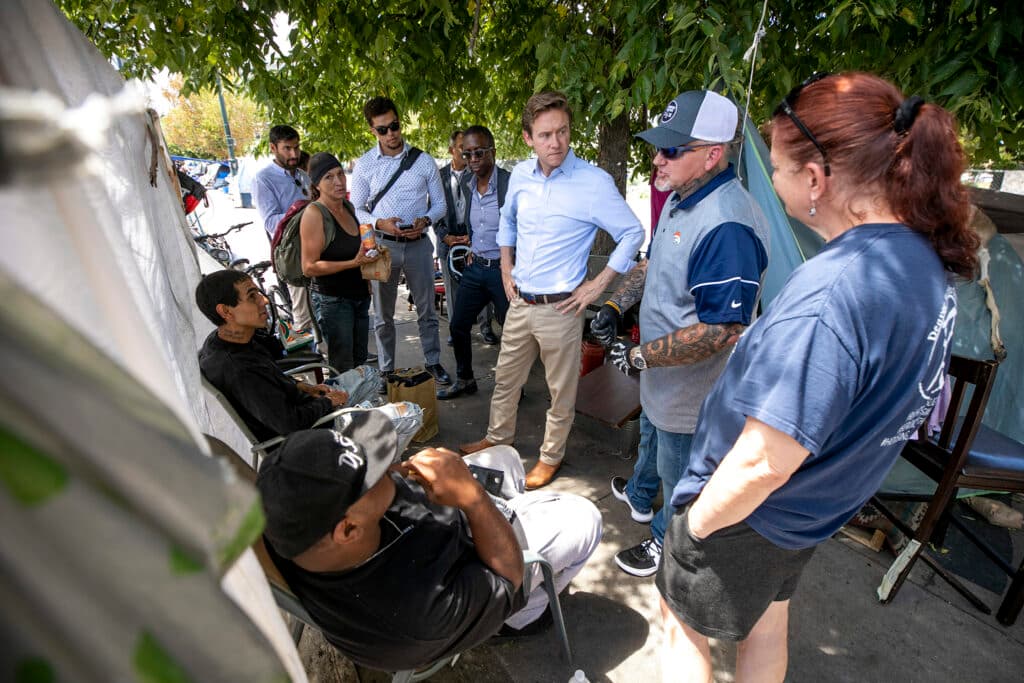
Failure for those brought inside and who later left the system has been higher than he anticipated.
The plurality of those who left the shelters, 188, returned to homelessness. Another 34 went to jail, and 12 died. The outcome for 53 people is unknown, though the city assumes it is bad.
Others had more successful outcomes, ranging from moving in with friends and family to securing subsidized housing.
Meanwhile, eviction cases continue to hit record numbers, putting more people than ever at risk of homelessness. Since the month Johnston took office, landlords filed a total of 15,248 eviction cases, according to court data. That’s far higher than the pre-pandemic norm of 8,999 per year.
Despite the challenges, he remains committed to reaching his goal.
“He is laser focused on ending unsheltered homelessness in Denver,” Fuja said. “In the next three years, we will continue to prioritize bringing more people off the streets and into transitional housing, while helping those currently in the programming access permanent affordable housing and receive the support services they need.”
The city is working to end veteran unsheltered homelessness in Denver by the end of the year.
Use federal and state money to pay for homelessness solutions and affordable housing.
So far: In part, yes. But it’s complicated.
Of the money spent, just over 62 percent of All In Mile High’s expenditures to date came from federal funds.
Much of the federal money he spent came from one-time pandemic emergency relief programs.
Federally funded pandemic relief dollars are set to expire at the end of the year. City Councilmember Stacie Gilmore told Denverite she wonders where the money will come from to pay for his ongoing All in Denver efforts.

As of April, City Council had approved upwards of $111 million for All in Mile High efforts. That number has likely grown since. That exceeds Johnston’s initial prediction of $87.8 million by more than $23 million, as 9News reported.
Of the local money spent, Fuja said 19.4 percent came from the voter-approved Homelessness Resolution Fund. 10.1 percent came from the Department of Housing Stability’s budget, 1.9 percent came from the General Fund, and 6.4 percent came from the city’s capital budget and other smaller sources.
One of the sources he promised to tap was Proposition 123, a measure for statewide funding for affordable housing he helped pass when he was in the statehouse. The city has received roughly $20 million from this source for multiple projects from new buildings to downpayment assistance programs.
Speed up permitting for new construction to 90 days, in part to satisfy Proposition 123's requirements.
So far: Yes.
A few days ago, Johnston declared victory in meeting his residential permitting goals, saying he’s sped up the time by 33 percent.
He says he’s also on track to reduce commercial permitting times by 30 percent by the end of the year.
According to Community Planning and Development’s dashboard, commercial projects, including multifamily buildings, are down to an average initial review time of 4.26 weeks.
Create roughly 25,000 permanently income-restricted units in eight years.
So far: No. And the goal is now bigger.
“Since July 2023, 449 city-funded units have opened or been preserved, with 2,038 currently under construction,” Fuja wrote. “Note that most housing projects take multiple years from conception to actually opening.”
And now, his goal is even higher: 44,000 in the next decade.

Johnston is asking the Council to ask voters to raise the sales tax by .5 percent, or five cents on every $10 purchase, to pay for the preservation or creation of those units.
Whether he can pull that off depends on whether the public likes his plan. Denverites historically rubber stamp most new taxes and view housing affordability as a top concern. Residents will likely vote on it this November if the City Council sends the measure their way.
Lower the cost of market-rate housing.
So far: Mostly, no.
According to the Consumer Price Index, the cost of housing is up 4 percent in the metro area.
The median price of a home, including houses and apartments, in Metro Denver is up year-over-year by 1.5 percent to $608,000, according to the Denver Metro Association of Realtors.
In slightly good news, rents are down .8 percent in the metro area, according to the online market Apartment List’s June report.
He has more work to do with City Council if he wants to reduce parking mandates and construction costs, as well as cut zoning requirements that make building dense housing impossible in swaths of the city.
“The city has already made significant progress toward these goals, and will continue to work across departments to cut red tape and streamline processes so builders and developers can continue to open units that are accessible for the population,” Fuja said.
A total of 579 affordable units, including 449 funded by the city, have opened since July 2023.
Spend $20 million to hire an additional 200 first responders to address violent and property crime.
So far: No.
Currently, his office does not know the exact amount he’s spent.
Denver Police Department currently has fewer officers than it did when Johnston took office.
"Denver Police has an Authorized Strength of 1639 members. As of June 21, 2024, there were 1457 sworn officers, with an additional 70 recruits in the Academy," according to a spokesperson from the department. "On June 23, 2023, the Authorized Strength was 1596. On that date, there were 1472 sworn officers, with 56 additional recruits in the Academy."
The Denver Sheriff Department, which is authorized to have 859 sworn staff members, currently has just 603 . That is up slightly from June of 2023, when there were just 567.
DPD anticipates having four recruit classes in 2024, Fuja said. The first two had groups of 35 and 36.
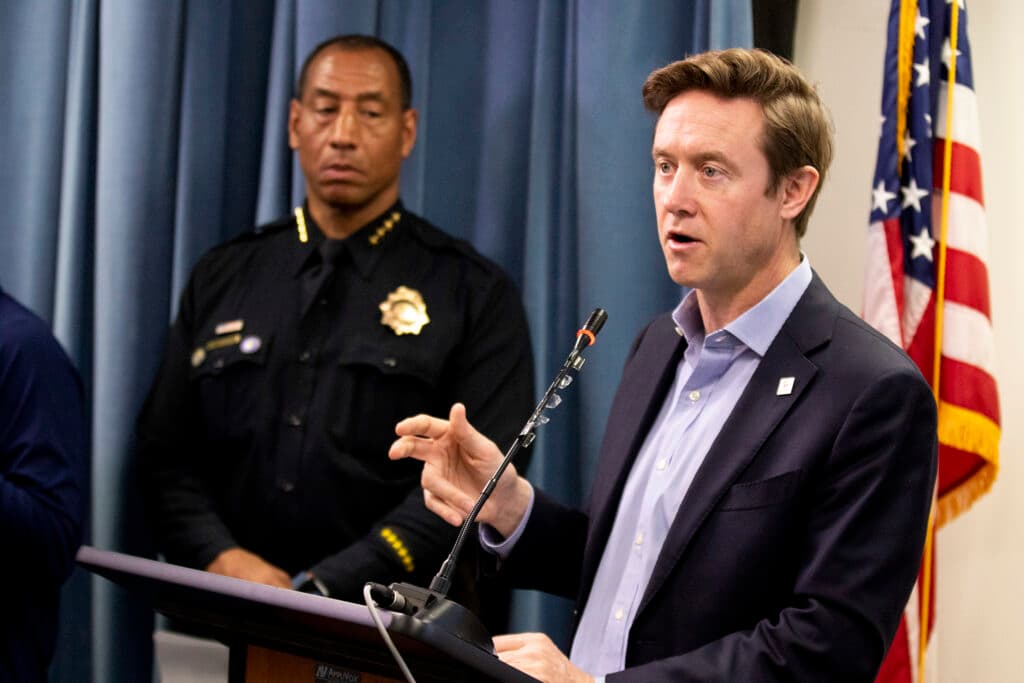
“The Denver Sheriff Department also welcomed 30 new deputy sheriffs in June, with another training class set to begin in August,” Fuja wrote. “Denver Fire just graduated their first class of 27 firefighters and are set to start our second class of the year in September, with 24 recruits.”
He also promised to increase the percentage of police cadets who are women to 50 percent. So far, the first recruit class was made up of 25 percent women, and the second of 38 percent.
Year-to-date crime rates have dropped under Johnston by more than 11 percent, with decreases in both violent and property crimes.
Negotiate a deal with Westside Investment Partners, owners of the Park Hill Golf Course, to purchase the land and turn it into a vibrant public space without using eminent domain.
So far: No.
The golf course is fenced off. The grass is brown. The city has not taken action.
Community Planning and Development has repeatedly told Denverite no progress has been made on this front, and no conversations are happening.
Westside has not responded to multiple requests for comment since failing to push their project past voters several times.
“The Mayor’s Office is working closely with the landowners and community leaders to identify the best path forward for the city,” Fuja said.
So far, no progress.
Ensure his out-of-state billionaire backers don't expect a return on investment.
So far: No.
“As he said on the campaign, Mayor Johnston does not answer to anybody except the residents of Denver,” Fuja said. “There have been no contracts or deals with any campaign backers.”
Many of Johnston’s biggest out-of-state backers are big players in artificial intelligence and tech.
Denver has embraced AI for its efficiencies.
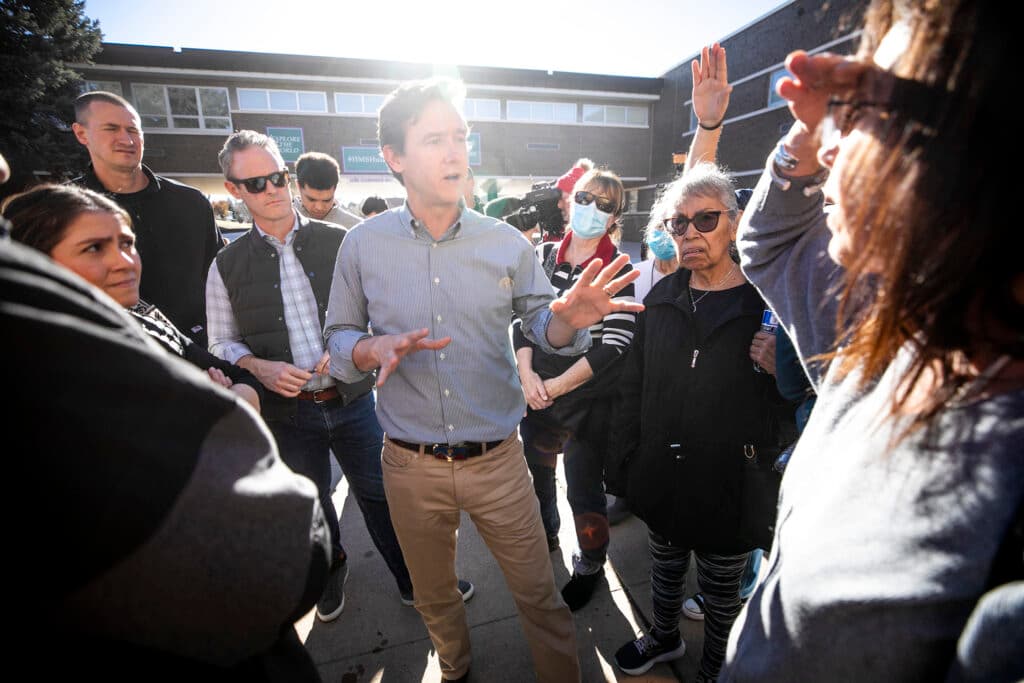
Artificial intelligence has been incorporated into the city’s 311 and police non-emergency-call systems. An automated system speeds up the electronic recycling program. Another assists Denver Arts & Venues with print jobs, and yet another has sped up reports for building inspectors.
The city will host the inaugural DenAI conference in the fall, where private and public sector leaders will explore how to put AI to work for the greater good.
“We are committed to partnering to harness that innovation for good,” Johnston said in a statement. “We want Denver to be a hub for responsible AI technology that is focused on how these technologies can help make cities around the world more affordable, safe, and vibrant.”
Voters will not front funding for a new Broncos stadium.
So far: He’s kept this pledge.
While there are rumblings about whether Broncos Stadium may or may not leave Denver for another Front Range city, no decisions have been made.
Neither the Broncos organization nor the administration have indicated they would ask voters to approve new taxes for a new stadium.
“Mayor Johnston will lay down in traffic to keep the Broncos in Denver,” Fuja said. “The Broncos are considering several sites, and we will continue to push to keep them in Denver.”
Make RTD better for commuters, children and seniors.
So far: It’s complicated.
This is a tough promise for a mayor who has little to do with RTD governance.
Ridership has increased by more than 11 percent year-to-date from 2023 to 2024.
The percentage of RTD busses that are on time has dropped in the first quarter of this year, compared to the same time last year.
What about free ridership for people under 20 and over 65, as he pledged? RTD has implemented a pilot program through August testing free ridership for people 19 and under. The agency also offers discounts to those 65 and older, though riding is still not free.
Push for the electrification of Denver to reduce greenhouse gas emissions and improve air quality.
So far: It’s complicated.
The Denver Department of Public Health and Environment does not currently have data reflecting emissions and air quality. The agency is working on a report for later in the year.
He pledged to eliminate gas hookups in new construction.
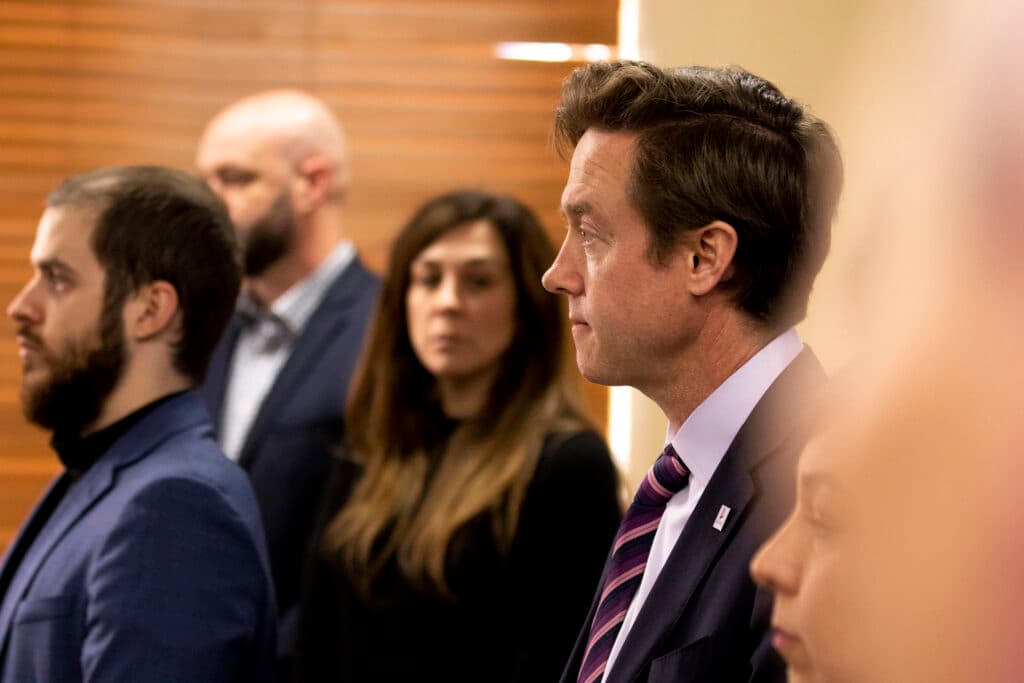
While the city is working on those plans, Denver has been sued by national and state business groups in a legal action that could upend the plan to eliminate gas-powered furnaces and water heaters.
The city is still offering incentives for energy efficiency upgrades and has expanded its commercial heat pump rebate program.
Work on other big transportation promises, too.
So far: Not a lot of progress.
The very popular e-bike rebate program has continued under Johnston administration.
He pledged to make every new light-weight vehicle the city purchases electric by 2025, unless he granted a personal exception. The mayor’s office did not offer data demonstrating progress on this.
He promised to speed up the timeline for the sidewalk improvement efforts. City Council has slowed down the fee collection for the program, which will not go into effect until January 2025.
Create a massive training program for new workers called Upskill Denver.
So far: No.
This has not happened for the general public.
In collaboration with local businesses, Johnston has created a summer employment program to encourage young people to get jobs.
“Responding to the influx of newcomers over the last year and a half, Denver has stood up an in-depth and comprehensive workforce training program, called WorkReady,” Fuja said.
Train new childcare workers and ensure they're paid a decent wage.
So far: No.
While there has been talk of increasing early child education centers as part of a $500 million investment in downtown Denver, that work has not begun.
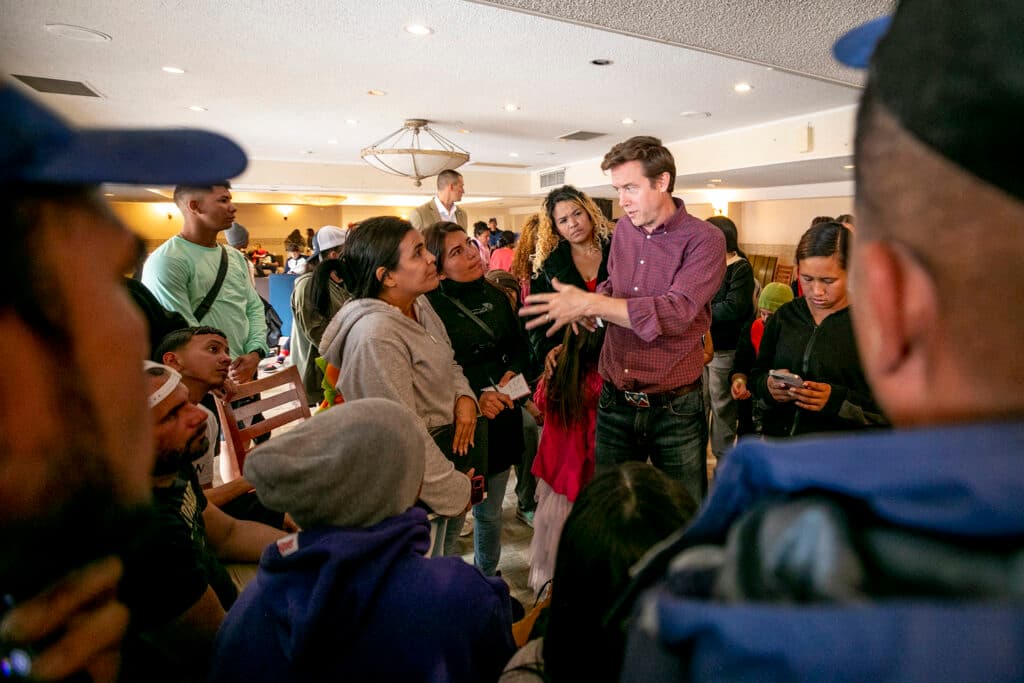
Support the arts, including creating a campus for an artist-in-residence program with housing.
So far: No.
Fuja said he’s working on it with Denver Arts and Venues. More will be announced soon.
Follow through on 74 of the 79 commitments with the Latino United Neighborhood Association.
So far: Very little.
The group — headed up by third-place finisher in the 2023 mayoral race, Lisa Calderón — has given him a D as of July.
His best scores are C- for economic justice for small businesses and union labor. He has Ds for economic justice at the airport, education equity and immigration.
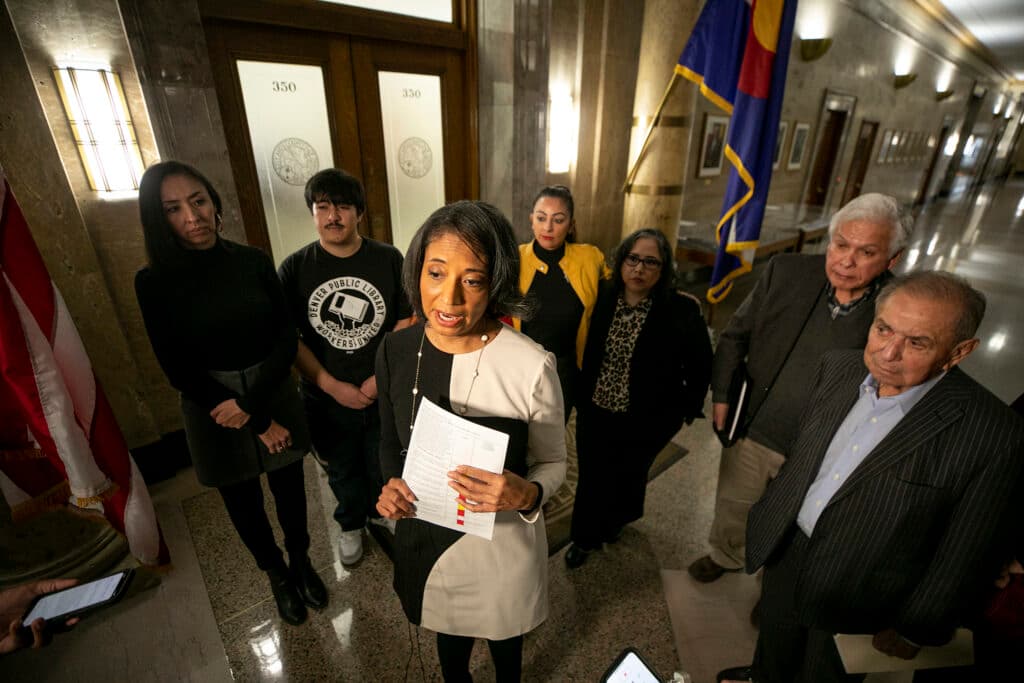
According to the group, he's scoring an F on leadership culture shifts, gentrification and displacement, public safety, and health and well-being.
“Mayor Johnston regularly works with the Latino community on city initiatives in order to meet their needs,” Fuja said. “He has already moved forward on a number of items listed in that scorecard and will continue to partner with the community to advance better city services.”
Revamp Denver's snow-plowing system.
So far: Yes.
During the large-scale March storm, the mayor’s office ensured a snow plow hit residential streets once every 24 hours and major arterial and collector streets once every 12 hours.
Commit to a robust and fair hiring process with his cabinet and appointees.
So far: In part.
Johnston’s hiring of department heads took a long time. Some praised him for being deliberative, while others scolded him for being sluggish.
Johnston declined to have an open hiring process for key public safety positions. He brought back Hancock-era leaders for the police, sheriff, fire and public safety departments.
Nonetheless, his cabinet reflects gender, cultural and racial diversity.
Make Denver America's best city.
So far: Not by national standards.
This one, of course, is subjective.
Meanwhile, U.S. News and World Report ranks Denver as the 40th best city to live in nationwide, an improvement. Colorado Springs, Boulder and Fort Collins secured higher spots on the list.
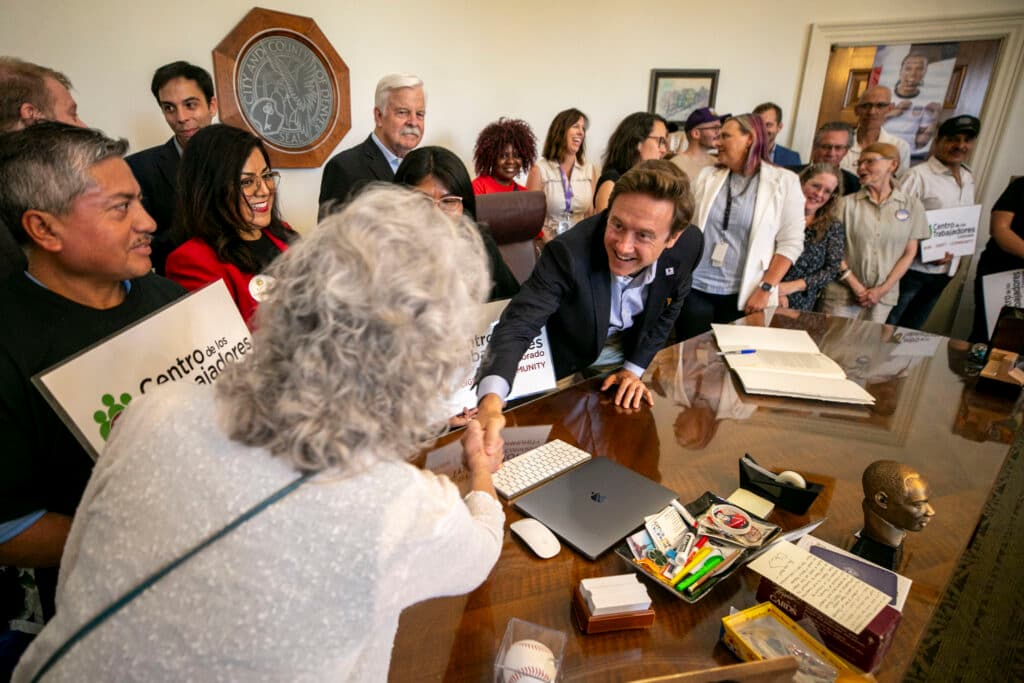
Denver did not rank in Forbes’ top 25 best places to live.
The city was oddly named Best City for Pizza by the real estate company Clever, a ranking that had many Denverites worrying about the state of pizza nationwide.
What’s next?
Many City Council members have expressed concerns that his administration has struggled with keeping Denver’s budget under control.
Gilmore says the city is facing the possibility of significant budget cuts in 2025.
City Council members have blasted him, along the way, for poor accounting. They want more detail from the departments he oversees.
Going into his second year in office and through another budgeting process, Johnston is looking at many new challenges.
The city will likely have softer sales tax revenue supporting his homelessness response, less pandemic-era emergency federal funding, and another likely rise in the number of new immigrants arriving in the fall.
Voters may say city workers can unionize, also raising questions about how the mayor will negotiate those labor relations.
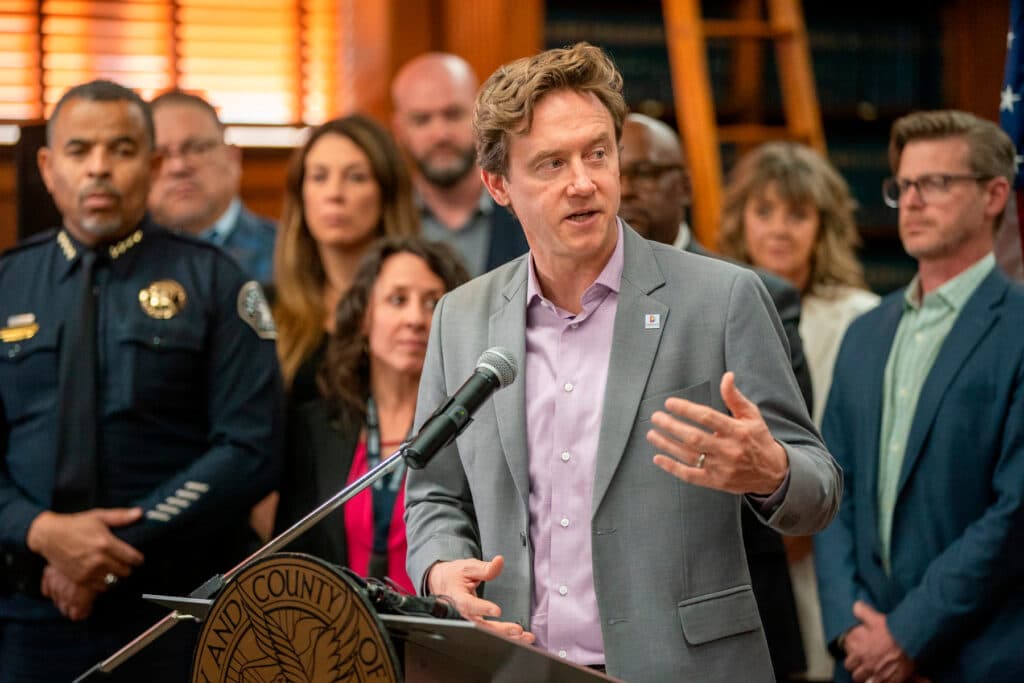
When he requests money from the city budget, Council will likely demand better numbers, more details, and stronger plans.
Housing prices, homelessness and public safety continue to dominate the concerns of Denverites. Whether they approve his plan to build 44,000 housing units will determine whether he can reach his goals.
Additionally, the 2024 election leaves many federal programs Johnston hopes to tap for multiple initiatives on the potential chopping block and the future of the border uncertain. National voters will decide whether his priorities match those of the next president and Congress.
As Johnston ends year one and heads into year two, what questions do you have for the mayor? How do you think he’s performing? Let us know at [email protected].
This story has been data from the Denver Police Department on how many officers are currently on the force.












